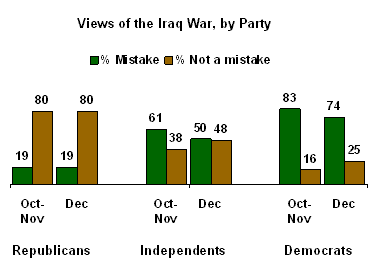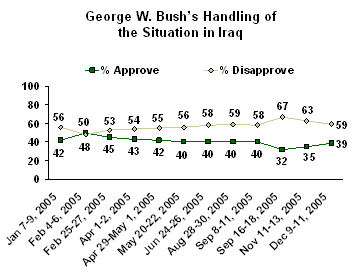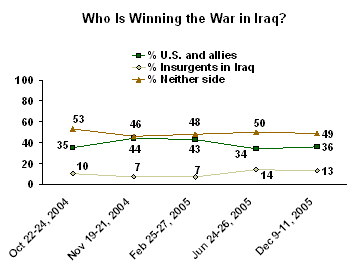Over the last few weeks, President George W. Bush has mounted a campaign to change public perceptions on the Iraq war with a series of speeches. A new CNN/USA Today/Gallup poll suggests the strategy could be having some effect. The poll shows fewer Americans now say the United States made a mistake in going to war in Iraq than have so in recent weeks, though the public is still divided on this issue. Although ratings for Bush's handling of Iraq remain quite negative, the percentage of Americans approving of his job on Iraq has increased slightly.
Additionally, a majority of Americans do not believe Bush has a plan that will achieve victory in Iraq. Other measures show essentially no change, including attitudes about who is winning the war, whether the United States can win the war, and what the United States should do about its troops.
Late October and mid-November Gallup Polls showed Americans, by a 54% to 45% margin, saying the United States made a mistake in sending troops to Iraq. The new Dec. 9-11 CNN/USA Today/Gallup poll shows a more evenly divided public, with slightly more saying the war was not a mistake (50%) than saying it was (48%). The last time supporters outnumbered opponents on this measure was in late July.

The more positive views on the war are apparent among Democrats and independents. Republicans have always been overwhelmingly supportive, and that support has not changed in recent weeks. Democrats still remain largely opposed to the war, but independents are now evenly divided after being mainly opposed in October and November.

Americans' views of Bush's handling of the situation in Iraq have also noticeably improved. In mid-September, just 32% approved of how Bush has handled this issue, the lowest of his presidency. In mid-November, that percentage improved slightly to 35%, and is at 39% in the latest poll. Even so, the current percentage remains one of the lowest approval ratings for Bush on Iraq, and is now only back to where it was this summer.

In contrast to the improvement on the "mistake" and Bush approval measures, most other measures about the war are stable.
About half of all Americans, 49%, say neither side is winning the war in Iraq. Thirty-six percent say the United States and its allies are winning, 13% say the insurgents in Iraq are. These views have essentially not changed since June. No more than 44% of Americans have said the United States and its allies are winning since the question was first asked in October 2004.

A more forward-looking question on victory in Iraq also shows little change from recent months. The question asks Americans to assess whether the United States can win the war in Iraq, and whether it will do so. Currently, 65% say the United States can win, but only 46% believe it will. Those percentages break down to 25% who say the United States will definitely win and 21% who say it probably will win, and 19% who think the United States can win the war but will not. Another 30% think the United States cannot win.
Which comes closer to your view about the war in Iraq -- [ROTATED: you think the U.S. will definitely win the war in Iraq, you think the U.S. will probably win the war in Iraq, you think the U.S. can win the war in Iraq, but you don't think it will win, (or) you do not think the U.S. can win the war in Iraq]?
|
|
Definitely |
Probably |
Can win, but |
Do |
No |
Net: Can |
Net: Will |
|
% |
% |
% |
% |
% |
% |
% |
|
|
2005 Dec 9-11^ |
25 |
21 |
19 |
30 |
5 |
65 |
46 |
|
|
|
|
|
|
|
|
|
|
2005 Nov 11-13 |
23 |
23 |
17 |
33 |
4 |
63 |
46 |
|
2005 Sep 16-18 |
21 |
22 |
20 |
34 |
3 |
63 |
43 |
|
^Asked of a half sample |
|||||||
Americans' pessimism about the United States' prospects for victory could stem from a lack of confidence in the commander in chief. The majority of Americans do not believe Bush has a plan that will achieve victory in Iraq -- 38% say he has such a plan; 58% say he does not.
Popular sentiment is still firmly behind reducing the U.S. military presence in Iraq -- 64% of Americans say the United States should withdraw troops from Iraq, including 38% who say it should withdraw some troops and 26% who say all troops. Just 9% of Americans say the United States should send more troops, while an additional 25% say it should keep the same number of troops in Iraq that it has now.
A majority of Americans have favored a reduction in U.S. troop levels since June.
Which comes closest to your view about what the U.S. should now do about the number of U.S. troops in Iraq -- [ROTATED: the U.S. should send more troops to Iraq, the U.S. should keep the number of troops as it is now, the U.S. should withdraw some troops from Iraq, (or) the U.S. should withdraw all of its troops from Iraq]?
|
Send more |
Keep same |
Withdraw |
Withdraw |
No |
Net: |
|
|
% |
% |
% |
% |
% |
% |
|
|
2005 Dec 9-11 |
9 |
25 |
38 |
26 |
2 |
64 |
|
|
|
|
|
|
|
|
|
2005 Sep 16-18 |
8 |
26 |
33 |
30 |
3 |
63 |
|
2005 Aug 28-30 |
19 |
26 |
27 |
26 |
2 |
53 |
|
2005 Aug 5-7 |
13 |
28 |
23 |
33 |
3 |
56 |
|
2005 Jun 6-8 |
10 |
26 |
31 |
28 |
5 |
59 |
|
2005 Feb 4-6 |
10 |
38 |
32 |
17 |
3 |
49 |
|
2005 Jan 14-16 |
24 |
26 |
21 |
25 |
4 |
46 |
|
2004 Sep 24-26 |
21 |
35 |
21 |
18 |
5 |
39 |
|
2004 Jun 3-6 |
18 |
30 |
23 |
27 |
2 |
50 |
|
2004 May 7-9 |
25 |
24 |
18 |
29 |
4 |
47 |
|
2004 Apr 16-18 |
33 |
25 |
16 |
21 |
5 |
37 |
|
2004 Apr 5-8 |
20 |
29 |
18 |
28 |
5 |
46 |
|
2004 Jan 2-5 |
11 |
40 |
29 |
16 |
4 |
45 |
|
2003 Dec 15-16 |
14 |
40 |
27 |
15 |
4 |
42 |
|
2003 Dec 5-7 |
22 |
33 |
25 |
17 |
3 |
42 |
|
2003 Nov 3-5 ^ |
17 |
32 |
29 |
19 |
3 |
48 |
|
2003 Oct 24-26 ^ |
14 |
27 |
39 |
18 |
2 |
57 |
|
2003 Aug 25-26 ^ |
15 |
36 |
32 |
14 |
3 |
46 |
|
^WORDING: "Which comes closest to your view about what the U.S. should now do about the number of U.S. troops in Iraq -- [ROTATED: the U.S. should send more troops to Iraq, the U.S. should keep the number of troops as it is now, the U.S. should begin to withdraw some troops from Iraq, (or) the U.S. should withdraw all of its troops from Iraq]?" |
||||||
Survey Methods
These results are based on telephone interviews with a randomly selected national sample of 1,003 adults, aged 18 and older, conducted Dec. 9-11, 2005. For results based on this sample, one can say with 95% confidence that the maximum error attributable to sampling and other random effects is ±3 percentage points. In addition to sampling error, question wording and practical difficulties in conducting surveys can introduce error or bias into the findings of public opinion polls.
13. In view of the developments since we first sent our troops to Iraq, do you think the United States made a mistake in sending troops to Iraq, or not?
|
Yes |
No |
No |
|
|
% |
% |
% |
|
|
2005 Dec 9-11 |
48 |
50 |
2 |
|
2005 Nov 11-13 ^ |
54 |
45 |
1 |
|
2005 Oct 28-30 |
54 |
45 |
1 |
|
2005 Oct 21-23 |
49 |
49 |
2 |
|
2005 Sep 16-18 |
59 |
39 |
2 |
|
2005 Sep 8-11 |
53 |
46 |
1 |
|
2005 Aug 28-30 |
53 |
46 |
1 |
|
2005 Aug 5-7 ^ |
54 |
44 |
2 |
|
2005 Jul 22-24 |
46 |
53 |
1 |
|
2005 Jun 24-26 |
53 |
46 |
1 |
|
2005 Apr 29-May 1 ^ |
49 |
48 |
3 |
|
2005 Mar 18-20 ^ |
46 |
51 |
3 |
|
2005 Feb 25-27 |
47 |
51 |
2 |
|
2005 Feb 4-6 |
45 |
55 |
* |
|
2005 Jan 14-16 |
52 |
47 |
1 |
|
2005 Jan 7-9 |
50 |
48 |
2 |
|
2004 Nov 19-21 |
47 |
51 |
2 |
|
2004 Oct 29-31 ^ |
44 |
52 |
4 |
|
2004 Oct 22-24 |
47 |
51 |
2 |
|
2004 Oct 14-16 |
47 |
52 |
1 |
|
2004 Oct 9-10 ^ |
46 |
53 |
1 |
|
2004 Oct 1-3 |
48 |
51 |
1 |
|
2004 Sep 24-26 |
42 |
55 |
3 |
|
2004 Sep 3-5 ^ |
38 |
57 |
5 |
|
2004 Aug 23-25 ^ |
48 |
50 |
2 |
|
2004 Jul 30-Aug 1 |
47 |
51 |
2 |
|
2004 Jul 19-21 |
50 |
47 |
3 |
|
2004 Jul 8-11 |
54 |
45 |
1 |
|
2004 Jun 21-23 |
54 |
44 |
2 |
|
2004 Jun 3-6 |
41 |
58 |
1 |
|
2004 May 7-9 |
44 |
54 |
2 |
|
2004 Apr 16-18 |
42 |
57 |
1 |
|
2004 Jan 12-15 |
42 |
56 |
2 |
|
2003 Nov 3-5 |
39 |
60 |
1 |
|
2003 Oct 6-8 |
40 |
59 |
1 |
|
2003 Jul 7-9 |
27 |
72 |
1 |
|
2003 Mar 24-25 |
23 |
75 |
2 |
|
^Asked of a half sample |
|||
14. Which comes closest to your view about what the U.S. should now do about the number of U.S. troops in Iraq -- [ROTATED: the U.S. should send more troops to Iraq, the U.S. should keep the number of troops as it is now, the U.S. should withdraw some troops from Iraq, (or) the U.S. should withdraw all of its troops from Iraq]?
|
Send more |
Keep as |
Withdraw |
Withdraw |
No |
|
|
% |
% |
% |
% |
% |
|
|
2005 Dec 9-11 |
9 |
25 |
38 |
26 |
2 |
|
|
|
|
|
|
|
|
2005 Sep 16-18 |
8 |
26 |
33 |
30 |
3 |
|
2005 Aug 28-30 |
19 |
26 |
27 |
26 |
2 |
|
2005 Aug 5-7 |
13 |
28 |
23 |
33 |
3 |
|
2005 Jun 6-8 |
10 |
26 |
31 |
28 |
5 |
|
2005 Feb 4-6 |
10 |
38 |
32 |
17 |
3 |
|
2005 Jan 14-16 |
24 |
26 |
21 |
25 |
4 |
|
2004 Sep 24-26 |
21 |
35 |
21 |
18 |
5 |
|
2004 Jun 3-6 |
18 |
30 |
23 |
27 |
2 |
|
2004 May 7-9 |
25 |
24 |
18 |
29 |
4 |
|
2004 Apr 16-18 |
33 |
25 |
16 |
21 |
5 |
|
2004 Apr 5-8 |
20 |
29 |
18 |
28 |
5 |
|
2004 Jan 2-5 |
11 |
40 |
29 |
16 |
4 |
|
2003 Dec 15-16 |
14 |
40 |
27 |
15 |
4 |
|
2003 Dec 5-7 |
22 |
33 |
25 |
17 |
3 |
|
2003 Nov 3-5 ^ |
17 |
32 |
29 |
19 |
3 |
|
2003 Oct 24-26 ^ |
14 |
27 |
39 |
18 |
2 |
|
2003 Aug 25-26 ^ |
15 |
36 |
32 |
14 |
3 |
|
^WORDING: "Which comes closest to your view about what the U.S. should now do about the number of U.S. troops in Iraq -- [ROTATED: the U.S. should send more troops to Iraq, the U.S. should keep the number of troops as it is now, the U.S. should begin to withdraw some troops from Iraq, (or) the U.S. should withdraw all of its troops from Iraq]?" |
|||||
Q.15-16 SPLIT SAMPLED
15. Who do you think is currently winning the war in Iraq -- the U.S. and its allies, the insurgents in Iraq, or neither side?
BASED ON 503 NATIONAL ADULTS IN FORM A
|
|
U.S. and |
Insurgents |
Neither |
No |
|
% |
% |
% |
% |
|
|
2005 Dec 9-11 ^ |
36 |
13 |
49 |
2 |
|
|
|
|
|
|
|
2005 Jun 24-26 |
34 |
14 |
50 |
2 |
|
2005 Feb 25-27 |
43 |
7 |
48 |
2 |
|
2004 Nov 19-21 |
44 |
7 |
46 |
3 |
|
2004 Oct 22-24 ^ |
35 |
10 |
53 |
2 |
|
^Asked of a half sample |
||||
16. Which comes closer to your view about the war in Iraq - [ROTATED: you think the U.S. will definitely win the war in Iraq, you think the U.S. will probably win the war in Iraq, you think the U.S. can win the war in Iraq, but you don't think it will win, (or) you do not think the U.S. can win the war in Iraq]?
BASED ON 500 NATIONAL ADULTS IN FORM B
|
Definitely |
Probably |
Can win, but |
Do not think |
No |
|
|
% |
% |
% |
% |
% |
|
|
2005 Dec 9-11 ^ |
25 |
21 |
19 |
30 |
5 |
|
|
|
|
|
|
|
|
2005 Nov 11-13 |
23 |
23 |
17 |
33 |
4 |
|
2005 Sep 16-18 |
21 |
22 |
20 |
34 |
3 |
|
^Asked of a half sample |
|||||
17. Do you think George W. Bush does -- or does not -- have a plan that will achieve victory for the United States in Iraq?
|
Yes, does |
No, does not |
No opinion |
|
|
2005 Dec 9-11 |
38% |
58 |
4 |
|
|
|
|
|
|
2005 Nov 30 ^ |
41% |
55 |
4 |
|
|
|||
|
^Polls conducted entirely in one day are subject to additional error or bias not found in polls conducted over several days. |
|||
19. Now thinking about the past two years, do you think Iraq has made real progress toward establishing a democratic government, or don't you think Iraq has made any progress in this area?
|
Yes, has made |
No, not made |
No |
|
|
|
|
|
|
|
2005 Dec 9-11 |
63% |
34 |
3 |